人教八年级英语上册Unit2单元教案
英语教案人教版八年级英语上册Unit 2 How often do you exercise
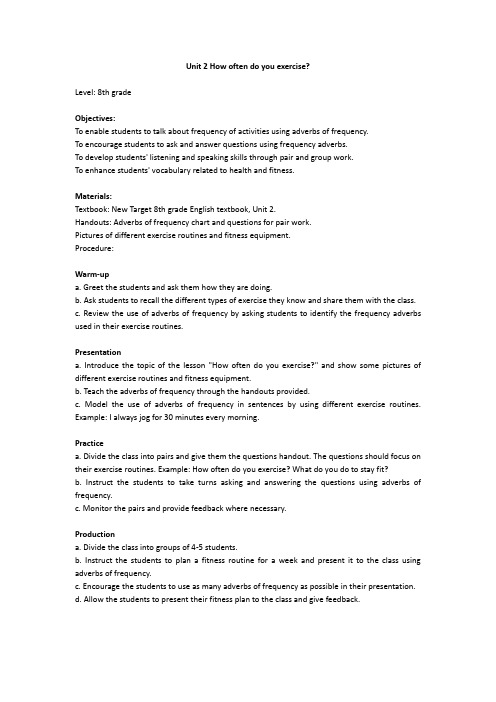
Unit 2 How often do you exercise?Level: 8th gradeObjectives:To enable students to talk about frequency of activities using adverbs of frequency.To encourage students to ask and answer questions using frequency adverbs.To develop students' listening and speaking skills through pair and group work.To enhance students' vocabulary related to health and fitness.Materials:Textbook: New Target 8th grade English textbook, Unit 2.Handouts: Adverbs of frequency chart and questions for pair work.Pictures of different exercise routines and fitness equipment.Procedure:Warm-upa. Greet the students and ask them how they are doing.b. Ask students to recall the different types of exercise they know and share them with the class.c. Review the use of adverbs of frequency by asking students to identify the frequency adverbs used in their exercise routines.Presentationa. Introduce the topic of the lesson "How often do you exercise?" and show some pictures of different exercise routines and fitness equipment.b. Teach the adverbs of frequency through the handouts provided.c. Model the use of adverbs of frequency in sentences by using different exercise routines. Example: I always jog for 30 minutes every morning.Practicea. Divide the class into pairs and give them the questions handout. The questions should focus on their exercise routines. Example: How often do you exercise? What do you do to stay fit?b. Instruct the students to take turns asking and answering the questions using adverbs of frequency.c. Monitor the pairs and provide feedback where necessary.Productiona. Divide the class into groups of 4-5 students.b. Instruct the students to plan a fitness routine for a week and present it to the class using adverbs of frequency.c. Encourage the students to use as many adverbs of frequency as possible in their presentation.d. Allow the students to present their fitness plan to the class and give feedback.Conclusiona. Summarize the lesson by asking the students to recall the use of adverbs of frequency.b. Ask the students to share what they have learned in the lesson.c. Assign homework, which could be to write a paragraph about their own exercise routine using adverbs of frequency.Assessment:The teacher can assess the students' understanding of the lesson through their participation in the pair and group work. The students' use of adverbs of frequency and their ability to ask and answer questions will be evaluated. The homework assigned will also be assessed for the students' use of adverbs of frequency.。
【人教版】新目标八年级英语上册:Unit 2 单元教学设计
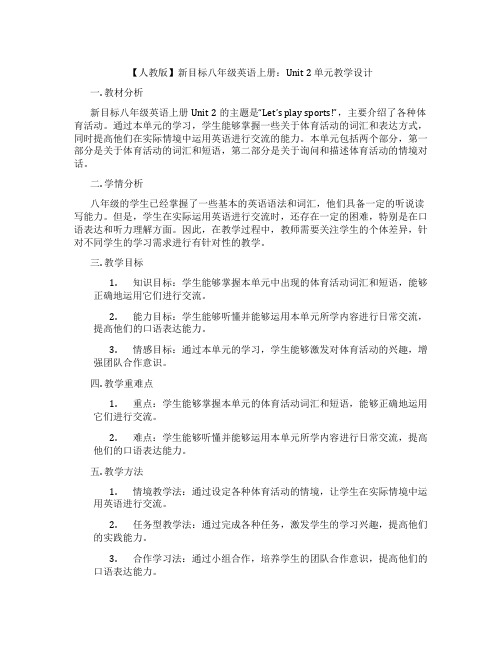
【人教版】新目标八年级英语上册:Unit 2 单元教学设计一. 教材分析新目标八年级英语上册Unit 2的主题是“Let’s play sports!”,主要介绍了各种体育活动。
通过本单元的学习,学生能够掌握一些关于体育活动的词汇和表达方式,同时提高他们在实际情境中运用英语进行交流的能力。
本单元包括两个部分,第一部分是关于体育活动的词汇和短语,第二部分是关于询问和描述体育活动的情境对话。
二. 学情分析八年级的学生已经掌握了一些基本的英语语法和词汇,他们具备一定的听说读写能力。
但是,学生在实际运用英语进行交流时,还存在一定的困难,特别是在口语表达和听力理解方面。
因此,在教学过程中,教师需要关注学生的个体差异,针对不同学生的学习需求进行有针对性的教学。
三. 教学目标1.知识目标:学生能够掌握本单元中出现的体育活动词汇和短语,能够正确地运用它们进行交流。
2.能力目标:学生能够听懂并能够运用本单元所学内容进行日常交流,提高他们的口语表达能力。
3.情感目标:通过本单元的学习,学生能够激发对体育活动的兴趣,增强团队合作意识。
四. 教学重难点1.重点:学生能够掌握本单元的体育活动词汇和短语,能够正确地运用它们进行交流。
2.难点:学生能够听懂并能够运用本单元所学内容进行日常交流,提高他们的口语表达能力。
五. 教学方法1.情境教学法:通过设定各种体育活动的情境,让学生在实际情境中运用英语进行交流。
2.任务型教学法:通过完成各种任务,激发学生的学习兴趣,提高他们的实践能力。
3.合作学习法:通过小组合作,培养学生的团队合作意识,提高他们的口语表达能力。
六. 教学准备1.教师准备:教师需要准备本单元的教学课件、教学素材和相关的体育活动器材。
2.学生准备:学生需要预习本单元的内容,熟悉并掌握相关的体育活动词汇和短语。
七. 教学过程1.导入(5分钟)教师通过向学生展示一些体育活动的图片,引导学生谈论他们喜欢的体育活动,激发学生的学习兴趣。
人教版英语八年级上册Unit2单元整体教学设计
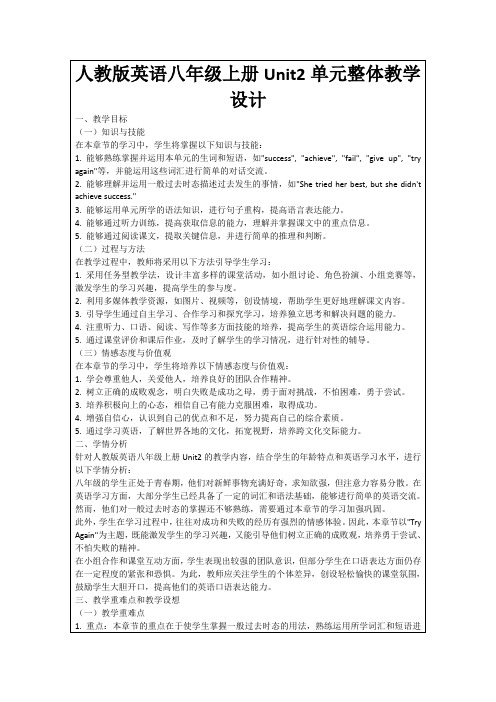
1.教学活动设计:
-教师引导学生回顾本节课所学内容,总结一般过去时态的用法和重点词汇。
-学生分享自己的学习心得,反思在学习过程中如何克服困难,勇于尝试。
2.教学过程:
-教师引导学生进行课堂小结,巩固学习成果。
-学生分享学习心得,教师给予鼓励和肯定,强化学生的学习动机。
-教师总结课堂内容,强调勇于尝试和面对失败的重要性,培养学生的积极心态。
2.能够理解并运用一般过去时态描述过去发生的事情,如"She tried her best, but she didn't achieve success."
3.能够运用单元所学的语法知识,进行句子重构,提高语言表达能力。
4.能够通过听力训练,提高获取信息的能力,理解并掌握课文中的重点信息。
5.能够通过阅读课文,提取关键信息,并进行简单的推理和判断。
1.教学活动设计:
-将学生分成小组,让他们针对课文内容进行讨论,探讨成功与失败的原因。
-设计小组讨论题目,引导学生结合自身经历,分享如何面对失败和挑战。
2.教学过程:
-学生在小组内展开讨论,共同分析课文中的成功与失败案例。
-学生分享自己的观点,讨论如何在面对失败时保持积极的态度,勇于尝试。
-教师巡回指导,关注学生的讨论过程,提供必要的语言支持。
在小组合作和课堂互动方面,学生表现出较强的团队意识,但部分学生在口语表达方面仍存在一定程度的紧张和恐惧。为此,教师应关注学生的个体差异,创设轻松愉快的课堂氛围,鼓励学生大胆开口,提高他们的英语口语表达能力。
三、教学重难点和教学设想
(一)教学重难点
1.重点:本章节的重点在于使学生掌握一般过去时态的用法,熟练运用所学词汇和短语进行交流,并能结合课文内容进行简单的推理和判断。
(新人教版)英语八年级上册 Unit 2 大单元教学设计
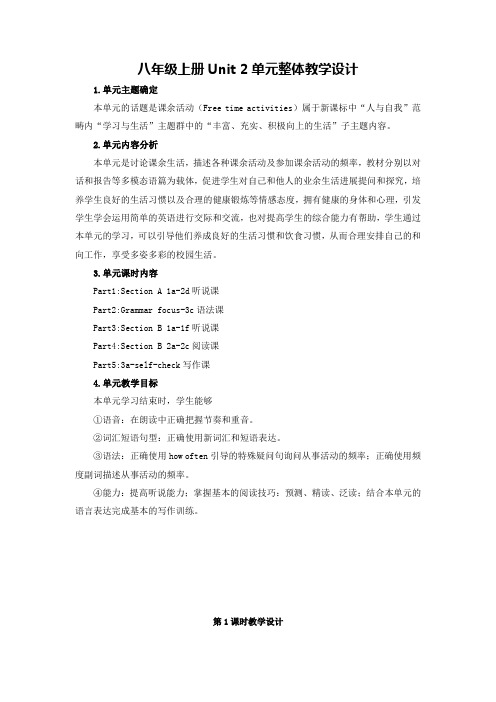
八年级上册Unit 2单元整体教学设计1.单元主题确定本单元的话题是课余活动(Free time activities)属于新课标中“人与自我”范畴内“学习与生活”主题群中的“丰富、充实、积极向上的生活”子主题内容。
2.单元内容分析本单元是讨论课余生活,描述各种课余活动及参加课余活动的频率,教材分别以对话和报告等多模态语篇为载体,促进学生对自己和他人的业余生活进展提问和探究,培养学生良好的生活习惯以及合理的健康锻炼等情感态度,拥有健康的身体和心理,引发学生学会运用简单的英语进行交际和交流,也对提高学生的综合能力有帮助,学生通过本单元的学习,可以引导他们养成良好的生活习惯和饮食习惯,从而合理安排自己的和向工作,享受多姿多彩的校园生活。
3.单元课时内容Part1:Section A 1a-2d听说课Part2:Grammar focus-3c语法课Part3:Section B 1a-1f听说课Part4:Section B 2a-2c阅读课Part5:3a-self-check写作课4.单元教学目标本单元学习结束时,学生能够①语音:在朗读中正确把握节奏和重音。
②词汇短语句型:正确使用新词汇和短语表达。
③语法:正确使用how often引导的特殊疑问句询问从事活动的频率;正确使用频度副词描述从事活动的频率。
④能力:提高听说能力;掌握基本的阅读技巧:预测、精读、泛读;结合本单元的语言表达完成基本的写作训练。
第1课时教学设计一、教学内容:Section A 1a-2d二、课型:听说课三、语篇研读What(主要内容):谈论课余简单的生活为主要话题,以对各类频度副词的学习和掌握,List(1a)看图列举周末活动;Listening(1b、2a、2b)主要是程涛正在讨论多久做这些活动,通过程涛的描述学习和理解频率的使用;Practice(1c、2c编对话关于周末有什么课余活动以及活动频率;Role-play(2d)Jack和Claire的对话,讨论下一周有哪些课余活动以及这些活动发生的频率,Claire丰富的课余生活。
【人教版】新目标八年级英语上册:Unit 2 单元说课稿

【人教版】新目标八年级英语上册:Unit 2 单元说课稿一. 教材分析新目标八年级英语上册Unit 2主要讲述了关于一般现在时的用法。
本单元包括两个部分:Section 1和Section 2。
Section 1主要介绍了一般现在时的基本结构和用法,通过一个关于家庭成员的对话和一个关于日常活动的,让学生理解和掌握一般现在时的构成和表示含义。
Section 2则通过一个故事和一个任务型阅读,进一步巩固一般现在时的用法,并引导学生运用一般现在时进行叙述和描述。
二. 学情分析八年级的学生已经掌握了英语学习的基本语法和词汇,具备一定的听、说、读、写能力。
但对于一般现在时的理解和运用,部分学生可能还存在一定的困难。
因此,在教学过程中,需要关注学生的个体差异,针对性地进行教学,帮助学生理解和掌握一般现在时的用法。
三. 说教学目标1.知识目标:学生能够理解一般现在时的概念、结构和用法,能够正确运用一般现在时进行叙述和描述。
2.能力目标:学生能够在日常交流中运用一般现在时,提高英语表达的能力。
3.情感目标:通过本单元的学习,学生能够培养对英语学习的兴趣,增强自信心。
四. 说教学重难点1.教学重点:一般现在时的结构、用法和意义。
2.教学难点:一般现在时的运用,特别是在具体情境中的运用。
五. 说教学方法与手段1.教学方法:采用任务型教学法、情境教学法和交际法,让学生在实际情境中理解和运用一般现在时。
2.教学手段:利用多媒体课件、图片、故事等教学资源,激发学生的学习兴趣,提高课堂参与度。
六. 说教学过程1.导入:通过一个与学生生活密切相关的场景,如询问学生家庭成员的姓名和年龄,引导学生进入一般现在时的学习。
2.新课呈现:通过一个关于家庭成员的对话和一个关于日常活动的,展示一般现在时的结构和用法。
3.实践环节:学生分组进行角色扮演,运用一般现在时进行对话,巩固所学知识。
4.任务型阅读:学生阅读一个关于故事的文章,回答相关问题,进一步理解一般现在时的用法。
【人教版】八年级英语上册 Unit 2 全单元英文教案

Unit 2 How often do you exercise?Language Goal 【语言目标】Talk about how often you do things:in this unit,students learn to talk about what things they do and how often they do these things.Knowledge Goals 【知识目标】Key Wordshousework,hardly,ever,once twice,full,maybe,least,junk,coffee,health,percent,online,although,through,mind,body,such,together,die,writer,dentist,magazine,however,than,almost,less,pointKey Phraseshow often,on weekends,go to the movies,hardlyever,twice a week,three times a week,be goodfor,at least,such as,less than,more than Key Sentences1. How often do you exercise?2.What do you usually do on weekends?Key Grammar1. The use of adverbs of frequency.2.“How often” cause of special questions andanswers.Ability Goals 【能力目标】1. Through the learning to gain the ability to talk about how often people do things.2.Write a report about how often people do things.Moral Goals 【情感目标】1. Keep a diary every day.2.Do more exercise and develop good habits to keep healthy.Teaching Time 【课时】Five periodsPeriod 1 Section A(1a-2d)Period 2 Section A(Grammar Focus-3c)Period 3 Section B(1a-1e)Period 4 Section B (2a-2e)Period 5 Section B (3a-Self Check)本单元的教学内容围绕“多久做一次运动”这一话题展开。
八年级英语上册-人教版-Unit 2 教学设计

八年级英语上册-人教版-Unit 2 教学设计一. 教材分析人教版八年级英语上册Unit 2主要介绍了日常生活中的一般疑问句,包括问候、介绍、询问时间、询问地点等场景。
通过本单元的学习,学生能够掌握一般疑问句的构成和用法,提高日常英语交流能力。
教材内容丰富,实用性较强,有利于激发学生学习兴趣。
二. 学情分析八年级的学生已经具备了一定的英语基础,对日常生活中的基本词汇和句型有所了解。
但部分学生对英语学习的兴趣不足,学习积极性有待提高。
此外,学生的英语水平参差不齐,教学过程中需关注不同层次学生的需求。
三. 教学目标1.知识目标:学生能够掌握一般疑问句的构成和用法,正确运用所学知识进行日常交流。
2.能力目标:提高学生的听、说、读、写能力,使其在实际情境中运用英语进行沟通。
3.情感目标:激发学生学习英语的兴趣,培养积极向上的学习态度。
四. 教学重难点1.重点:一般疑问句的构成和用法。
2.难点:一般疑问句在实际情境中的运用。
五. 教学方法1.情境教学法:通过设定各种日常生活中的情境,让学生在实际语境中学习、运用英语。
2.交际法:鼓励学生积极参与课堂互动,提高实际英语交流能力。
3.任务型教学法:通过完成各种任务,激发学生学习兴趣,巩固所学知识。
六. 教学准备1.教学素材:准备相关的图片、视频、音频等教学素材。
2.教学设备:投影仪、计算机、音响等教学设备。
3.作业布置:提前布置相关预习任务,让学生预习本节课的内容。
七. 教学过程1.导入(5分钟)利用图片、视频等素材,引入本节课的主题,激发学生学习兴趣。
同时,检查学生对上一节课内容的掌握情况。
2.呈现(10分钟)通过展示图片、实物等,呈现本节课的主要内容,引导学生观察、思考。
同时,用英语介绍一般疑问句的构成和用法。
3.操练(15分钟)将学生分成小组,进行角色扮演,模拟日常生活中的场景,运用一般疑问句进行交流。
教师巡回指导,纠正发音和语法错误。
4.巩固(10分钟)设计一些练习题,让学生填写或回答,巩固对一般疑问句的理解和运用。
人教版八年级上英语unit2教案
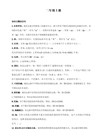
Step5.Groupwork
(1). Get the class to read the eight items in groups and try to understand the phrases.
② A: What’s the matter?
B: She/He has a cold/ sore throat /stomachache…
A: She/He should see a doctor/ have a rest/ take some medicine…
If your group get the most stars, your will be the winner.
Step4. Learn the illness
(1).Give the students an example:
Hold the head and say: I have a headache.
S: I have a headache.
Ss: You should go to see a doctor.
(5). Get the students to read the conversation in 3a and fill in the blanks. Then read the passage in groups or in pairs. Then ask the class to make a similar conversation and role play it in front of the class.
人教版八年级英语上册教材Unit2 教案
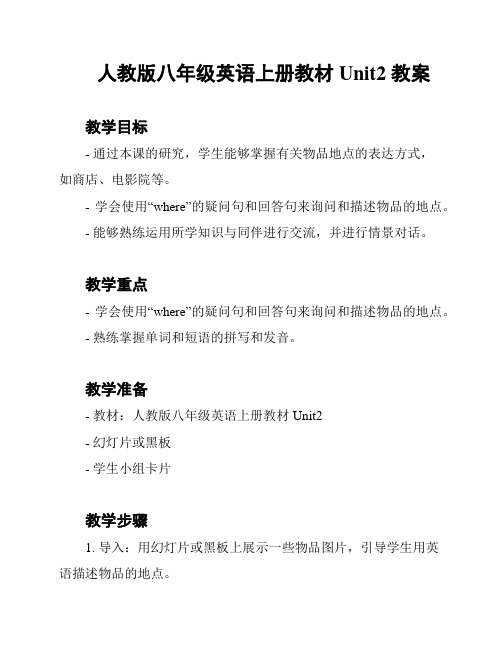
人教版八年级英语上册教材Unit2 教案
教学目标
- 通过本课的研究,学生能够掌握有关物品地点的表达方式,
如商店、电影院等。
- 学会使用“where”的疑问句和回答句来询问和描述物品的地点。
- 能够熟练运用所学知识与同伴进行交流,并进行情景对话。
教学重点
- 学会使用“where”的疑问句和回答句来询问和描述物品的地点。
- 熟练掌握单词和短语的拼写和发音。
教学准备
- 教材:人教版八年级英语上册教材Unit2
- 幻灯片或黑板
- 学生小组卡片
教学步骤
1. 导入:用幻灯片或黑板上展示一些物品图片,引导学生用英
语描述物品的地点。
2. 研究新知:通过教材Unit2的相关内容,教授目标词汇和短语,让学生理解并记忆。
3. 练活动:进行对话练,学生分组,每个小组选择一个物品进行情景对话,询问和回答物品的地点。
4. 拓展活动:让学生运用所学知识,创造自己的对话,交流物品的地点。
5. 归纳总结:让学生回顾所学知识,进行总结归纳。
6. 作业布置:布置课后作业,要求学生练复述本课内容,并使用疑问句和回答句描述物品地点。
教学评价
- 通过学生的课堂表现、练活动和讨论活动来进行评价,检查学生是否能够正确运用所学语言进行物品地点的描述。
- 提供及时的反馈,鼓励学生用英语进行交流。
注意事项
- 确保课堂秩序,引导学生积极参与。
- 注重学生的口语能力培养,鼓励他们进行对话练。
- 提供足够的练机会,让学生熟练掌握所学知识。
以上为人教版八年级英语上册教材Unit2的教案,根据课堂实际情况适当调整教学步骤。
【人教版】新目标八年级英语上册:Unit2单元教学设计
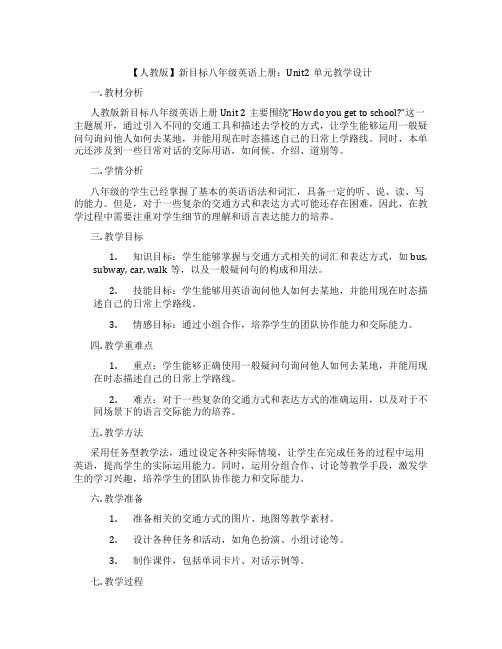
【人教版】新目标八年级英语上册:Unit2单元教学设计一. 教材分析人教版新目标八年级英语上册Unit 2主要围绕“How do you get to school?”这一主题展开,通过引入不同的交通工具和描述去学校的方式,让学生能够运用一般疑问句询问他人如何去某地,并能用现在时态描述自己的日常上学路线。
同时,本单元还涉及到一些日常对话的交际用语,如问候、介绍、道别等。
二. 学情分析八年级的学生已经掌握了基本的英语语法和词汇,具备一定的听、说、读、写的能力。
但是,对于一些复杂的交通方式和表达方式可能还存在困难,因此,在教学过程中需要注重对学生细节的理解和语言表达能力的培养。
三. 教学目标1.知识目标:学生能够掌握与交通方式相关的词汇和表达方式,如bus,subway, car, walk等,以及一般疑问句的构成和用法。
2.技能目标:学生能够用英语询问他人如何去某地,并能用现在时态描述自己的日常上学路线。
3.情感目标:通过小组合作,培养学生的团队协作能力和交际能力。
四. 教学重难点1.重点:学生能够正确使用一般疑问句询问他人如何去某地,并能用现在时态描述自己的日常上学路线。
2.难点:对于一些复杂的交通方式和表达方式的准确运用,以及对于不同场景下的语言交际能力的培养。
五. 教学方法采用任务型教学法,通过设定各种实际情境,让学生在完成任务的过程中运用英语,提高学生的实际运用能力。
同时,运用分组合作、讨论等教学手段,激发学生的学习兴趣,培养学生的团队协作能力和交际能力。
六. 教学准备1.准备相关的交通方式的图片、地图等教学素材。
2.设计各种任务和活动,如角色扮演、小组讨论等。
3.制作课件,包括单词卡片、对话示例等。
七. 教学过程1.导入(5分钟)利用图片和地图,引导学生谈论自己平时如何去学校,激发学生的学习兴趣。
2.呈现(10分钟)展示与本课主题相关的词汇和句型,如“How do you get to school?”和各种交通方式的词汇。
人教版新目标八年级英语第2单元Unit2教案
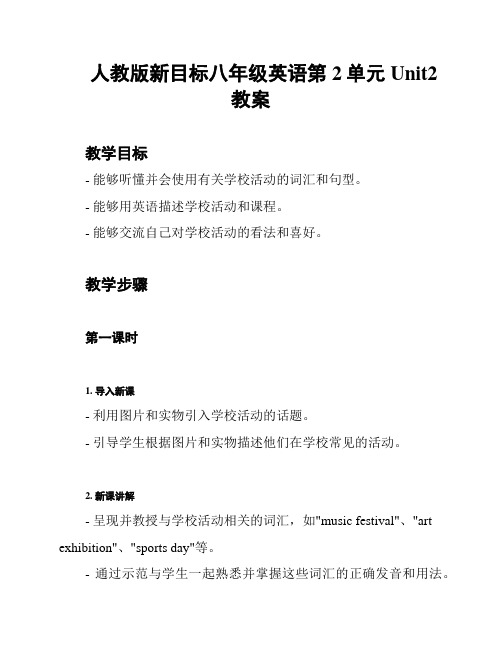
人教版新目标八年级英语第2单元Unit2教案教学目标- 能够听懂并会使用有关学校活动的词汇和句型。
- 能够用英语描述学校活动和课程。
- 能够交流自己对学校活动的看法和喜好。
教学步骤第一课时1. 导入新课- 利用图片和实物引入学校活动的话题。
- 引导学生根据图片和实物描述他们在学校常见的活动。
2. 新课讲解- 呈现并教授与学校活动相关的词汇,如"music festival"、"art exhibition"、"sports day"等。
- 通过示范与学生一起熟悉并掌握这些词汇的正确发音和用法。
- 操练这些词汇,并与学生一起编制句子来描述学校活动。
3. 听力训练- 播放关于学校活动的对话,要求学生仔细听并选择正确的图片。
- 学生互相对话,讨论听到的对话内容。
4. 对话练- 分组或两人一组,让学生模仿对话,表演关于学校活动的场景。
- 鼓励学生用英语进行自由对话,并互相分享自己参与过的学校活动。
5. 作业布置- 课堂分发作业卷,要求学生写一篇短文,介绍自己最喜欢的学校活动,并陈述原因。
第二课时1. 短文分享- 学生轮流与同桌分享自己写的短文。
- 鼓励其他学生提出问题或表达对短文的意见和建议。
2. 阅读训练- 学生阅读一篇关于学校活动的短文,并回答相关问题。
- 教师引导学生理解短文的内容,帮助他们解决阅读中遇到的问题。
3. 语法讲解- 教授句子结构"What do you think of + 学校活动?"和相应的答语。
- 帮助学生理解并掌握这种句子结构的用法。
4. 语法练- 学生分组或两人一组,互相提问"What do you think of + 学校活动?"并回答对方。
- 引导学生用所学词汇和句型互相交流和讨论自己对学校活动的看法和喜好。
5. 总结课堂内容- 教师带领学生回顾本节课所学的词汇、句型和语法。
人教版英语八年级上册unit2:How-often-do-you-exercise教案
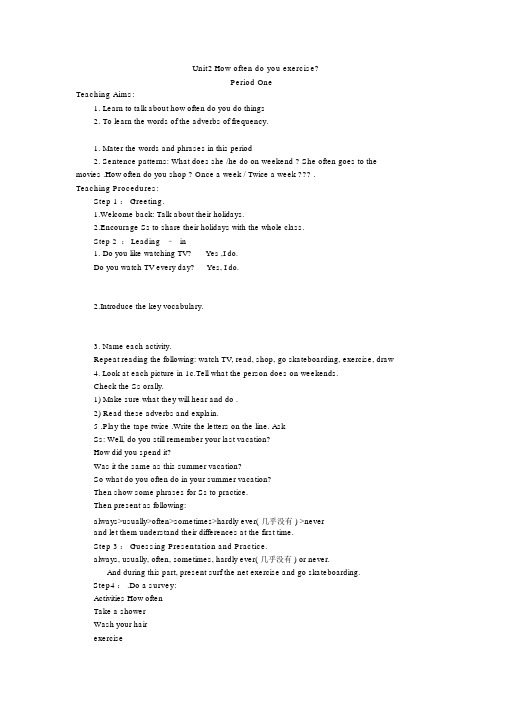
Unit2 How often do you exercise?Period OneTeaching Aims:1.Learn to talk about how often do you do things2.To learn the words of the adverbs of frequency.1.Mater the words and phrases in this period2.Sentence patterns: What does she /he do on weekend ? She often goes to the movies .How often do you shop ? Once a week / Twice a week ??? .Teaching Procedures:Step 1 : Greeting.1.Welcome back: Talk about their holidays.2.Encourage Ss to share their holidays with the whole class.Step 2: Leading–in1. Do you like watching TV?Yes ,I do.Do you watch TV every day?Yes, I do.2.Introduce the key vocabulary.3. Name each activity.Repeat reading the following: watch TV, read, shop, go skateboarding, exercise, draw4.Look at each picture in 1c.Tell what the person does on weekends.Check the Ss orally.1) Make sure what they will hear and do .2) Read these adverbs and explain.5.Play the tape twice .Write the letters on the line. AskSs: Well, do you still remember your last vacation?How did you spend it?Was it the same as this summer vacation?So what do you often do in your summer vacation?Then show some phrases for Ss to practice.Then present as following:always>usually>often>sometimes>hardly ever( 几乎没有 ) >neverand let them understand their differences at the first time.Step 3 : Guessing Presentation and Practice.always, usually, often, sometimes, hardly ever( 几乎没有 ) or never.And during this part, present surf the net exercise and go skateboarding.Step4 : .Do a survey:Activities How oftenTake a showerWash your hairexerciseClean your roomAsk and answer: How often do you take a shower?How often does he take a shower?Let Ss ask and answer in pairs, using always, usually, often, sometimes, hardly ever(几乎没有) or never.Step 5: HomeworkPeriod Two ( Section A2a-2b)Teaching Aims:1.Students can learn to talk about activities and how often to each other2.Students can listen, talk, read and write these words correctlyTeaching Difficulties:1.Words: once, twice, internet, program, full, swing2.Phrases: swing dance3.Sentence patterns: How often do you shop? I shop once a month.How often does Cheng watch TV? He watches TV ..Teaching Aids:Tape recorder; Multi-Media.Teaching Procedures:Step 1 : Greeting.Step 2 : RevisionWhat do you usually do on weekends?What does he usually do on weekends?What do they usually do on weekends?Step 3 : PresentationShow a calendar to students .T:What ’ s this ? Can you name it ?Ss : It ’ s a calendar .T : Very good . Look , this is the weekend . Saturday and Sunday are the weekends .What do you do on weekends ? First have students discuss and answer the question like this .A : What do you do on weekends ?B : I often play football.Then direct out“ how often⋯?”A : What do you usually watch TV on weekends ?B : I usually watch TV on weekends .A : How often do you watch TV ?B : I watch TV once a week/three times a month/every day( 告学生是表率的)⋯(The teacher must help students answer the question.因能够加学生言的感知,用个法频频两三句子,学生自然就会种言的表达了)Step 4 Listening and writingFirst have students listen listen to the tape once .At the same time , tell students the conversation about Cheng is talking how often he does different avtivities .First number the activities they hear (1-5) . Then have students listen again andtyr to match his activities with the number of times he does them .Step 5 PairworkHave students talk about what they do on weekends and How often do they do something each other ?Eg :A : What do you do sth on weekends ?B : I often do sth .A : How often do you do sth ?B : I do sth every .Then have some pairs to act out their conversations.Step5 Practise in writing .First help students finish“ question for underlined part”Eg: He goes to the movies three times a month .How often does he go to the movies ?Then have students finish the following evercises .1 . I often go to the movies . ( 划部分提)2 .他每周看一次。
人教版八年级英语上册unit2单元教案

2. Ability objects
Writing skill.
Listening skill.
Communicative competence
3. Moral object
Keep a diary every day in English.
II. Teaching Key Points
Step 5 2c Fill in the chart and makeconversations.
A: How often do you watch TV?
B:I watch TV every day.
A: What’s your favorite program?
B: Animal World
A: How often do you watch TV?
Step 7 Summary :Grammar Focus
1.the use of these words: always, often usually, sometimes, never, hardly ever, never,
2..How often do you watch TV?
Twice a week.
Step 6 Homework
Now homework: Remember the new words and the phrases in the class, and recite the dialogue in 1c. Prepare lessons before class.
Step 7 Blackboard Design
watch TV go to the movies read books exercise shop
人教版八年级英语上册Unit 2 说课稿
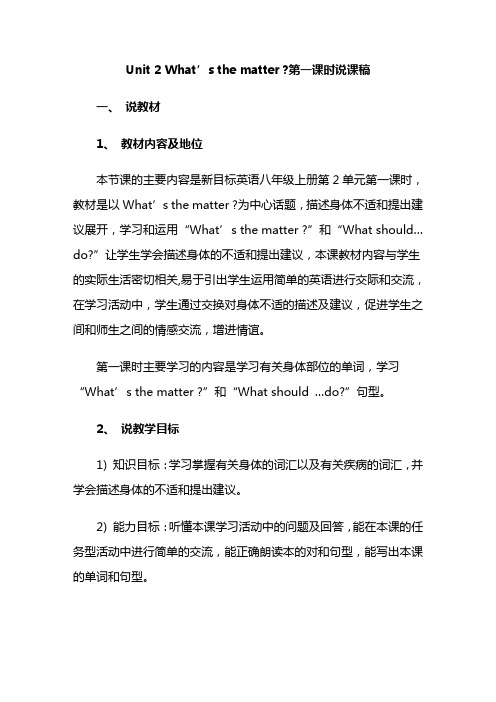
Unit 2 What’s the matter ?第一课时说课稿一、说教材1、教材内容及地位本节课的主要内容是新目标英语八年级上册第2单元第一课时,教材是以What’s the matter ?为中心话题,描述身体不适和提出建议展开,学习和运用“What’s the matter ?”和“What should…do?”让学生学会描述身体的不适和提出建议,本课教材内容与学生的实际生活密切相关,易于引出学生运用简单的英语进行交际和交流,在学习活动中,学生通过交换对身体不适的描述及建议,促进学生之间和师生之间的情感交流,增进情谊。
第一课时主要学习的内容是学习有关身体部位的单词,学习“What’s the matter ?”和“What should …do?”句型。
2、说教学目标1) 知识目标:学习掌握有关身体的词汇以及有关疾病的词汇,并学会描述身体的不适和提出建议。
2) 能力目标:听懂本课学习活动中的问题及回答,能在本课的任务型活动中进行简单的交流,能正确朗读本的对和句型,能写出本课的单词和句型。
3) 情感目标:通过描述自己的身体的不适提出建议,表达自己的看法,使学生在人际交往中学会关心别人,增进情谊。
4) 文化意识目标:用恰当的方式表达自己的看法,增进人际交往中学会关心别人的能力,了解英美国家询问和表达身体不适的习惯,培养世界意识。
3、说教学重难点重点:本节课主要学习身体部位的单词和一些疾病的词汇,以及身体不适的表达及建议。
难点:身体不适的表达及建议二、说学情初二年级的学生对英语已经有了一定的基础,但本地区部分学生对学习英语的兴趣不是很浓,在学习中,他们更喜欢从游戏中或活动中学习,这样更能提高他们的学习兴趣,让他们更轻松地掌握英语知识。
三、说教法作为教学的引导着,我遵循新课程“学生是学习的主人,一切的教学活动设计在以学生为本”的教学理念,坚持“为学生的发展,必须培养学生的自主性、能动性、独立性和创造性”的教学原则。
人教版八年级英语上册Unit2教案.doc
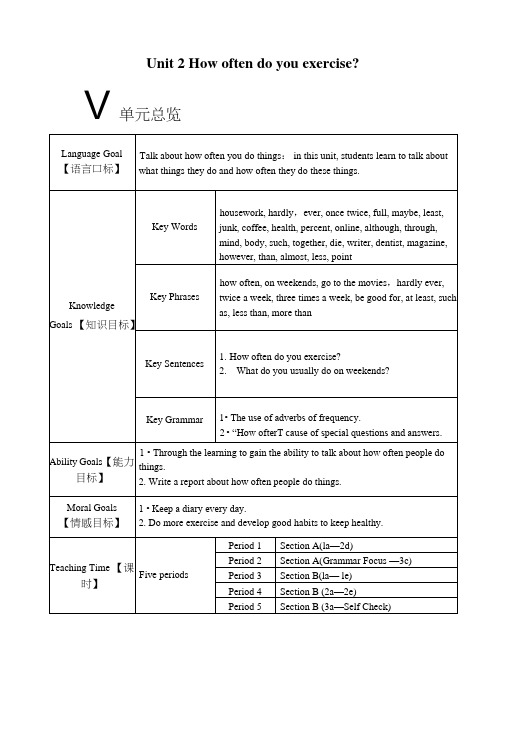
Unit 2 How often do you exercise? V单元总览为单元教材分析本单元的教学内容圉绕“多久做一次运动”这一话题展开。
Section A是基本语言内容的收集和学习,这一部分引导学生通过本课的语言素材进行看图说话、句型演练、实际描述,通过对话表演等使学生能够止确地使用表示做什么活动的词组,多久做一次的句型,从而熟练地谈论多久做一次活动。
Section B是知识的扩展和语言的综合运用,是在Section A的基础上,锻炼学生能够自如地谈论自己的生活习惯。
这些内容都是与学生口常生活紧密相关的,学生很熟悉,也乐于去说,因此在这一课题的教学过程中,应紧密联系学生生活实际,采用多种方式,以说为主,配合听的练习,最终以对话为途径,解决本课题的中心语句。
这易于引发学生学会运用简单的英语进行交际和交流,也对提高学牛的综合能力,特别是说的能力很有帮助。
学生通过对本单元的学习,可以引导他们养成良好的生活习惯和饮食习惯,从而合理安排自己的各项工作,享受丰富多彩的校园生活。
母,课时分解.第一课时Section A(la-2d)Teaching Goals [教学目标】Key words:housework, hardly, ever, once, twice, Internet, program, full, swing Key phrases:how often, on weekends, go to the movies, help with housework, hardly ever, go shopping, once/twice a week/a month, swing danceKey sentences:1.What do you usually do on weekends ? I often go to the movies.2.How often do you watch TV? I watch TV every day.Teaching Key Points【教学重点】The vocabulaw:housework, hardly. ever, once, twice, how often, on weekends, go to the movies, go shopping, help with housework, once/twice/three times a week/a month Target language:What do you usually do on weekends? I often go to the movies. Does he go shopping? No, he never goes shopping. How often do you have piano lessons? Twice a week, on Wednesday and Friday.Teaching Difficult Points 【教学难点】l.The adverbs of frequency: always, usually, often, sometimes, hardly ever, never2.Target language above.Teaching Aids【教学工具】An English textbook, a tape recorder, CAI or courseware.Teaching Steps【教学过程】★Step 1 Leading in1 • Greetings: Talk about something the students did on summer vacation.2.Check the homework.★Step 2 Pre—taskPage 9, la.I • Look at the picture. each activity.T: What are they doing?S: They are shopping/reading/exercising/watching TV/helping with housework・ (Help the students to answe匚)3.Write the activities on the line.4.Check the answers on the board.5.Practice reading.Page 9, lc.1 • Focus on the conversation in the box.2.Practice reading.3.Pair-work: What do you do on weekends? I…4.Group-work: Divide the class into groups of four or five. Make conversations. First SI to S2:S1: What do you do on weekends?S2: I...S1: What does she/he do on weekends?S2: She/He...5 • Act out their own dialogues.★ Step 3 While—taskPage 9, lb.1 • Look at each picture above la.Tell what the person does on weekends. Check the Ss orally.2.Make sure what they will hear and do.3.Read these adverbs and explain.4.Play the tape twice. Write the letters on the line.Page 10, 2a & 2b.1 • Read the activities and the answers of "how ofterT first.2. Practice reading.3- In 2a we should know the activities you hea匚In 2b we should know the answers of how often he does the activities.4.Play the tape for the first time. Ss only listen.5.Play the tape a second time. Ss do 2a.6.Play the tape a third time. Check the answers.7.Play the tape. Ss do 2b.8.Check the answers.In this part, we shoul d pay attention to “how often95 cause of special questions and answers.★Step 4 Post—taskPage 10, 2c & 2d.1• Focus on the conversation in 2c first.2- Practice reading.3.Read the activities in the left box.4.Fill in the chart.5• Pair-work: Make conversations.6.Make students scan the conversation in 2d.7.Teach and then make Ss role-play the conversation in pairs. In this part, student A will be Jack. Student B will be Claire. As they talk, move around to monitor their work. Offer language or pronunciation support as needed.8.Have a group of students present their conversation to the class.★Step 5 Homework1 • Practice the conversation in 2d.2.Do the exercises on Page 8 in students1 book.Board Design板书设计Unit 2 How often do you exercise?The first period Section A( 1 a—2d)1 - Key vocabulary: housework, once, twice, full, how often, on weekends, go to the movies, help with housework, hardly ever, once a week, three times a month2.表示动作的频率由高到低依次是always(100%), usually(80%), of(en(30%〜50%), sometimes(20%)> hardly ever(5%), never(0%)o第二课时Section A(GF-3c)Teaching Goals【教学目标】Key words & phrases:maybe, least, at least, once a month, stay up, twice a week, eat a healthy breakfast, go to bed, play sports,after schoolKey sentences:I .What do you usually do on weekends? I always exercise.2.Do you go shopping? No, I never go shopping.3.How often do you read English books? I read English books about twice a week.Teaching Key Points【教学重点】The vocabulary:maybe, least,at least, once a month, twice a weekTarget language:How often do you read English books? I read English books twice a week.Teaching Difficult Points 【教学难点】Target language above.Teaching Aids【教学工具】An English textbook, CAI or courseware.Teaching Steps【教学过程】★Step 1 Leading in1 • Greetings.2.Drills:T: What do you usually do on weekends?SI: I usually play soccer.T: How often do you play soccer?SI : I play soccer twice a week.T: How often does he play soccer?The other Ss: He plays soccer twice a week.Repeat for three times-★Step 2 Pre—taskPage 11, Grammar Focus.1 • Review the grammar box. Ss say the questions and answers.2.Practice reading.★Step 3 While—taskPage 11, 3a & 3b.1 • Call students1 attention to 3a.Make students scan the questions and answers first, then students complete the task in 3a individually.2.Choose a student to give his or her answers. Write them on the board・3• Correct the answers-4.Practice reading.5.Pair-work: Students work in pairs to complete the task in 3b・6.Write your answers on the line.★ Step 4 Post—taskPage 11, 3c.1.T: What can you do to improve your English?(e.g. read English books, practice reading and speaking)How often do you...?2.Think of more things you can do to improve your English and write them here.3.Ask several Ss each question.4.See: Who is the best English student in the class?★Step 5 Homework1 • Revise the new words.2. Do the exercises on Page 9 in students1 book.Board Design 板书设计Unit 2 How often do you exercise?The second period Section A(GF—3c)1 • Key vocabulary: maybe, at least, once a month, stay up, twice a week2.Target language:A: How often do you read English books?B: I read English books about twice a week.第三课时Section B(la—le)Teaching Goals【教学目标】Key words & Dhrases:junk, coffee, health, junk food, be good forKev sentences:How often do you drink milk, Liu Fang? I drink milk every day.Teaching Key Points【教学重点】The vocabulary:junk food, coffee, health, healthy, be good forTarget language:How often do you drink milk, Liu Fang? I drink milk every day. Do you like it? No. But my mother wants me to drink it. She says its good for my health.Teaching Difficult Points 【教学难点】“How often^ cause of special questions and answers.Teaching Aids【教学工具】An English textbook, a tape recorder, CAI or courseware.Teaching Steps【教学过程】★Step 1 Leading in1 • Gre etings & free talk.2. Practice reading the conversation on Page 10.3 • Check the homework.★Step 2 Pre—taskPage 12, la./ospjoxo noX op uoijo MOH :V :9§En§UE| )9§JUI•乙JOJpoo§ oq ^pooj ”un『^qjjusq :Xjujnquo OA Ao齐•[(巩一引用uonoos pouod pjiqj oq丄^asiajaxa noX op uayo MOJJ Z Ijufj44强年0* U贡SOQ pjcog^•”ooq 4siU0pn)s ui OJ Q S BJ UO sospj^xa。
初中英语人教版八年级上册Unit2教案
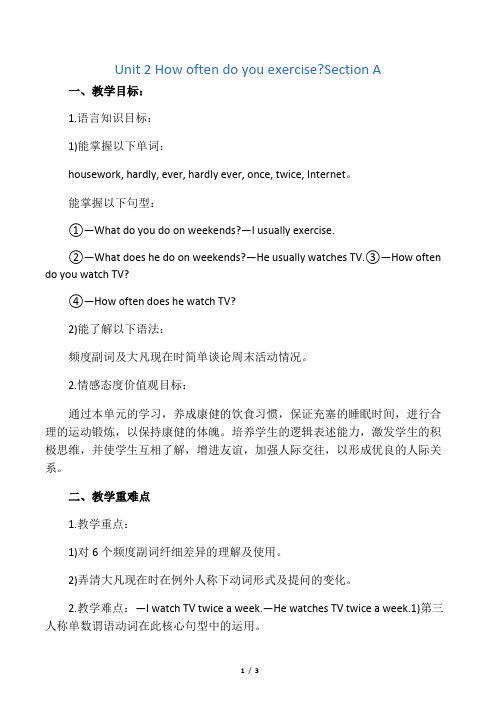
Unit 2 How often do you exercise?Section A一、教学目标:1.语言知识目标:1)能掌握以下单词:housework, hardly, ever, hardly ever, once, twice, Internet。
能掌握以下句型:①—What do you do on weekends?—I usually exercise.②—What does he do on weekends?—He usually watches TV.③—How often do you watch TV?④—How often does he watch TV?2)能了解以下语法:频度副词及大凡现在时简单谈论周末活动情况。
2.情感态度价值观目标:通过本单元的学习,养成康健的饮食习惯,保证充塞的睡眠时间,进行合理的运动锻炼,以保持康健的体魄。
培养学生的逻辑表述能力,激发学生的积极思维,并使学生互相了解,增进友谊,加强人际交往,以形成优良的人际关系。
二、教学重难点1.教学重点:1)对6个频度副词纤细差异的理解及使用。
2)弄清大凡现在时在例外人称下动词形式及提问的变化。
2.教学难点:—I watch TV twice a week.—He watches TV twice a week.1)第三人称单数谓语动词在此核心句型中的运用。
2)谈论课余时间的各项活动,以及初步认识和使用频率副词。
三、教学过程Ⅰ. Lead inTalk about the weather and your weekend’s activities.Ⅱ. Presentation(1) T asks:“Whatis the weather like today?” (show the question on white board)Ask Ss to answer :It’s……today.(2) Then,T says:,“So, we can’t exercise on rainy day, but maybe we can exercise onweekends. What do you usually do on w eekends?”Ask Ss to answer, then show the words:housework……ask Ss to answer (accordingto the pictures)(3)Show the frequency words.always (100%)usually(80%)often (30-50%)sometimes (20%)hardly ever(5%)never (0%)ask Ss to read and learn them, show the sentences about these words.Ⅲ. Writing1.Lookatthepicture.Discusswithyourpartners.Makealistoftheweekendactivities.2. Let some Ss read out their activities. Let other Ss add more activities.Ⅳ. Listening1. Let a student read the words aloud. Make sure all the Ss know the meaning of thewords.2. Tell Ss to listen and write the letters from the picture above on the line below.3. Play the tape for the first time. Ss listen and fill in the blanks.4. Play the tape for the second time for the Ss to check the answers.Ⅴ. Pair work1. Act out the conversation with a student.2. Let Ss talk about the pictures in 1a in pairs.3. Let some Ss act out their conversations.Ⅵ. Group work1. Let Ss read the words in 1a.2. Let Ss make new conversations, then work with groups, ask and answer questions.3. Ask one or two students to work with T, ask and answer questions.4. Act out the conversations without books.Ⅷ. Practice1. Show the questions about do or does.2. Ask Ss to fill in the blanks.3. Ask Ss to answer, then check and read.Homework:1. Practice the conversation in SecA-1c2. Make your own conversations and write them down.。
人教新目标英语八年级上册Unit2全单元教学设计

-采用多元化评价方式,包括自评、互评和教师评价,全面评估学生的学习效果。
-及时给予学生正面反馈,鼓励学生继续努力,同时指出需要改进的地方。
8.课后延伸:
-布置与课堂内容相关的家庭作业,巩固所学知识。
-鼓励学生在课后进行英语实践活动,如制作关于学校生活的海报、编写小对话等。
四、教学内容与过程
人教新目标英语八年级上册Unit2全单元教学设计
一、教学目标
(一)知识与技能
在本单元的教学中,学生将通过学习人教新目标英语八年级上册Unit 2的内容,掌握以下知识与技能:
1.词汇:学生能够掌握并运用与学校生活、课程及活动相关的词汇,如subject, math, science, history, gym, music, art, favorite, difficult, fun, test, grade等。
2.知识储备:学生对学校生活、课程及活动有一定了解,但关于一般现在时态的运用尚不够熟练,需要进一步巩固。
3.学习兴趣:学生对与自身生活密切相关的话题感兴趣,本单元主题与学生的实际生活紧密相关,有利于激发学生的学习兴趣。
4.学习方法:学生在学习过程中,需要教师的引导和启发,逐步培养自主学习、合作学习和探究学习的能力。
2.导入新课:通过歌曲、视频或简短的游戏等活动,激发学生的学习兴趣,自然引入新课主题。
-例如,播放一首关于学校的歌曲,引导学生谈论歌曲中提到的学科和活动。
3.词汇教学:
-利用图片、实物等直观教具,帮助学生记忆和理解新词汇。
-采用分组竞赛、接龙游戏等形式,让学生在互动中巩固词汇。
4.语法教学:
-通过情景剧、角色扮演等方式,让学生在实际语境中感知和运用一般现在时态。
人教版八年级英语上册-Unit2-教案
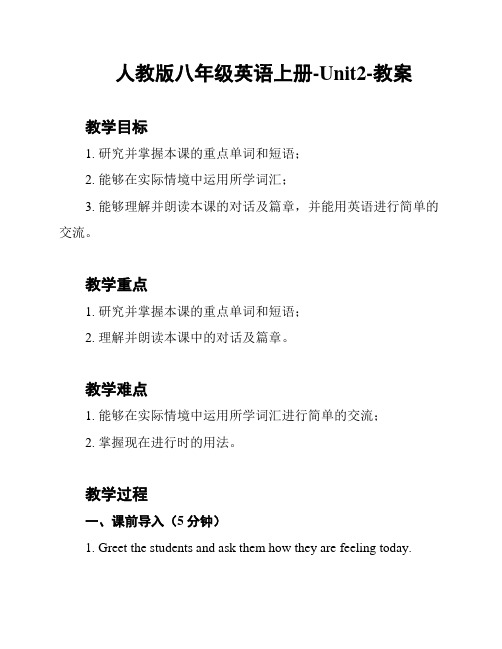
人教版八年级英语上册-Unit2-教案教学目标1. 研究并掌握本课的重点单词和短语;2. 能够在实际情境中运用所学词汇;3. 能够理解并朗读本课的对话及篇章,并能用英语进行简单的交流。
教学重点1. 研究并掌握本课的重点单词和短语;2. 理解并朗读本课中的对话及篇章。
教学难点1. 能够在实际情境中运用所学词汇进行简单的交流;2. 掌握现在进行时的用法。
教学过程一、课前导入(5分钟)1. Greet the students and ask them how they are feeling today.2. Show some pictures on the screen and try to ask them what the pictures are about.二、自主研究(35分钟)1. 学生们自主研究课文,并做好笔记,记录不熟悉的内容和需要了解的疑点。
2. 学生们可以在自主研究的过程中互相讨论并互相帮助。
三、交流展示(15分钟)1. 当做完自主研究后,老师开始组织学生展示他们的研究成果,展示方式并不限定,有朗读、问答等,总之要把研究到的知识用出来,让知识得到巩固。
2. 学生们可以相互交换信息或者反馈,梳理研究内容,发现问题。
四、课堂总结(5分钟)1. 了解本节课的教学内容,培养学生研究语言的兴趣。
2. 学生们要及时复和总结,才能让这些知识真正掌握。
教学板书设计1. 本课的重点单词和短语。
2. Was he doing exercise? Yes, he was.课后作业1. 完成本课课后的题。
2. 总结课上学到的内容。
- 1、下载文档前请自行甄别文档内容的完整性,平台不提供额外的编辑、内容补充、找答案等附加服务。
- 2、"仅部分预览"的文档,不可在线预览部分如存在完整性等问题,可反馈申请退款(可完整预览的文档不适用该条件!)。
- 3、如文档侵犯您的权益,请联系客服反馈,我们会尽快为您处理(人工客服工作时间:9:00-18:30)。
领读频率副词,让学生快速认读。
川.Writing
1.Look at the picture. Discuss with your partn ers. Make a list of
the weeke nd activities.
3—Does he go shopp ing?—No, he n ever go shopp ing.
2)能了解以下语法:
频度副词及一般现在时简单谈论周末活动情况。
2.情感态度价值观目标:
通过本单元的学习,养成健康的饮食习惯,保证充足的睡眠时间,进行合理的运动锻炼,以
保持健康的体魄。培养学生的逻辑表述能力,激发学生的积极思维,并使学生互相了解,增
3.Check the an swers.
VD. Pair work
1.Ask one stude nt how ofte n he/she watch TV as a model.
T: Hi, S1. How often do you watch TV?
S1: I watch TV every day.
activities. Play the recording for the first time. Ss listen and
nu mber the activities [1-5].
3.Play the record ing for the sec ond time for the Ss to check the
an swers.
Work on 2b:
1.Tell Ss they will hear the recording again. This time, listen
and match the activities in 2a with how often Cheng Tao does them.
2.Ss listen and math the activities with the phrases.
3.Let some Ss act out their con versati ons.
W.Liste ning
Work on 2a:
1.Let Ss read the phrases in the chart.
2.Tell Ss that Cheng Tao is tak ing about how ofte n he does these
板 书 设 计
Unit2Sectio n A 1(1a-2d)
—What does he do on weeke nds?
—He usually watches TV.
—How ofte n do you watch TV?
—I watch TV every day.
—Does he go shopp ing?
(2)教师出示动词卡片watch TV,read books,exercise,swimplay
football、go shopping、go to movies让学生回答。
(3)点击鼠标屏幕上出现频率副词及相关的百分比。
always(100%)usually(80%)ofte n (30-50%)
学校
三中
学科年级
八年英语
课型
新授课
课时
1
主备人
张晓林
检查人
教研组长
设计时间
2014.8
修改时间
2014.9
课题:Unit2How ofte n do you exercise? Section A 1 (1a-2d)
教学目标:1.语言知识目标:
1)能掌握以下单词:housework, hardly, ever, hardly ever, once, twice, Internet,
program, full, swing, swing dance, maybe, least, at least
能掌握以下句型:
1一What does he do on weekends?—He usually watches TV.
2—How ofte n do you watch TV?—I watch TV every day.
2.Let some Ss read out their activities. Let other Ss add more activities.
IV. Liste ning
1.Let a student read the words aloud. Make sure all the Ss know
进友谊,加强人际交往,以形成良好的人际关系。
教学重点:1)对6个频度副词细微差异的理解及使用。
2)弄清一般现在时在不同人称下动词形式及提问的变化。
教学难点:1)第三人称单数谓语动词在此核心句型中的运用。
2)谈论课余时间的各项活动,以及初步认识和使用频率副词。
课前准备:PPT and Learni ng Guide
—No, he n ever go shopp ing.
I . Lead in
Talk about your last weekend's activitieห้องสมุดไป่ตู้.
n . Presentation
(1)教师问:“What do you usually do on weekends ?”(并且板书)
让学生根据自己的实际回答I usuallyon weeke nds.
4.Play the tape for the second time for the Ss to check the answers.
V.Pair work
1.Act out the conversation with a student.
2.Let Ss talk about the pictures in 1a in pairs.
the meaning of the words.
2.Tell Ss to liste n and write the letters from the picture above
on the line below.
3.Play the tape for the first time. Ss listen and fill in the blanks.
